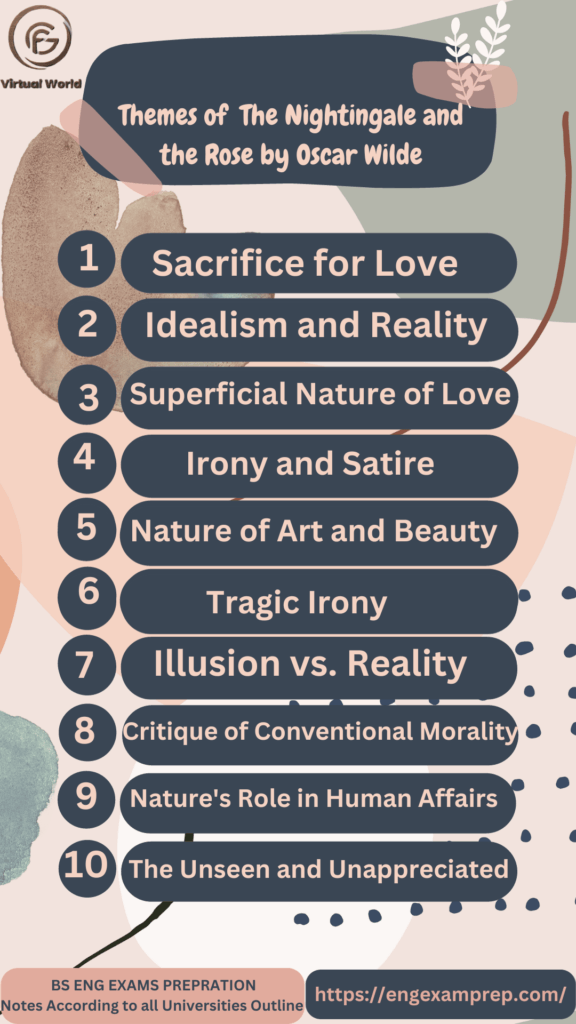Some important Themes Of The Nightingale and the Rose by Oscar Wilde.
1. Sacrifice for Love
Sacrifice for Love is the 1st theme of The Nightingale and the Rose by Oscar Wilde
- The Nightingale’s ultimate sacrifice is an expression of pure, selfless love.
- Critique on societal expectations that demand sacrifice for the sake of love.
2. Idealism and Reality
Idealism and Reality is the 2nd theme of The Nightingale and the Rose by Oscar Wilde
- The contrast between the idealistic nature of the Nightingale and the harsh reality faced by the student.
- Exploration of the disparity between romantic ideals and the pragmatism of the real world.
3. Superficial Nature of Love
The superficial Nature of Love is the 3rd theme of The Nightingale and the Rose by Oscar Wilde
- Satirical commentary on the superficiality of the student’s love and the girl’s materialistic expectations.
- Wilde’s critique of societal norms that prioritize appearances over genuine emotions.
4. Irony and Satire
Irony and Satire are the 4th theme of The Nightingale and the Rose by Oscar Wilde.
- Use of irony to highlight the disparity between Nightingale’s perception of love and the actual outcome.
- Satirical elements aimed at questioning societal romantic ideals prevalent in Wilde’s time.
5. Nature of Art and Beauty
Nature of Art and Beauty is the 5th theme of The Nightingale and the Rose by Oscar Wilde
- Aestheticism is reflected in Nightingale’s appreciation for beauty and the creation of the red rose.
- Examination of society’s inclination towards external beauty and material possessions.
6. Tragic Irony
Tragic Irony is the 6th theme of The Nightingale and the Rose by Oscar Wilde
- The tragic irony in the Nightingale’s sacrifice and the realization that its sacrifice is in vain.
- Exploration of the darker aspects of love and the consequences of idealistic actions.
7. Illusion vs. Reality
Illusion vs. Reality is the 7th theme of The Nightingale and the Rose by Oscar Wilde
- Wilde’s challenge to the conventional understanding of reality, emphasizing the unseen and underappreciated aspects of life.
- The artificiality of the red rose as a symbol of the illusions created by societal expectations.
8. Critique of Conventional Morality
Critique of Conventional Morality is the 8th theme of The Nightingale and the Rose by Oscar Wilde.
- Criticism of societal norms that lead to tragic outcomes, questioning the morality of sacrificing one’s life for a fleeting and superficial cause.
- Challenging the moral compass of a society that fails to recognize genuine sacrifice and love.
9. Nature’s Role in Human Affairs
Nature’s Role in Human Affairs is the 9th theme of The Nightingale and the Rose by Oscar Wilde
- The Nightingale is a representative of nature, highlighting nature’s involvement in shaping human emotions and actions.
- Examination of the interconnectedness of the natural world with human affairs.
10. The Unseen and Unappreciated
The Unseen and Unappreciated is the 10th theme of The Nightingale and the Rose by Oscar Wilde
- Emphasis on the unseen, unheard, and unappreciated elements of life, symbolized by the Nightingale’s sacrifice.
- Encouragement to look beyond the surface and recognize the deeper, often overlooked, aspects of love and existence.
These themes collectively contribute to the depth and complexity of Wilde’s “The Nightingale and the Rose,” inviting readers to contemplate the intricacies of love, sacrifice, and societal expectations.
